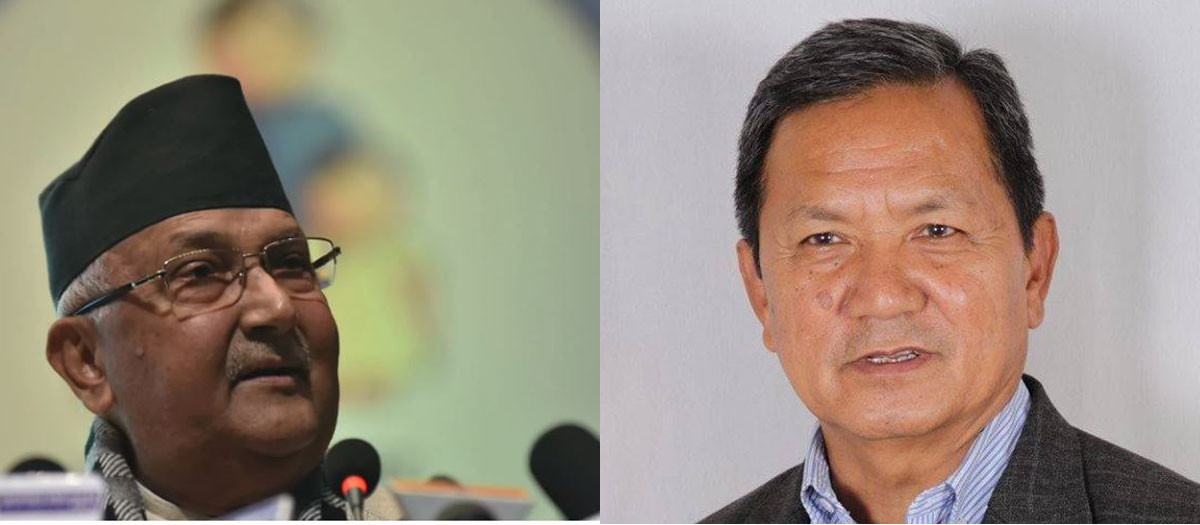Prime Minister (PM) KP Sharma Oli during the discussion on the government's policies and programs in the federal parliament on May 7 claimed that provincial and local governments are not autonomous and are under the federal government instead.
A few lawmakers had complained during the discussion that the policies and programs seem to treat the provincial and local governments to be under the federal one.
"All the governments are not independent. I heard some honorable lawmakers complain that provincial governments have been treated as if they are under the federal government. They are under the federal government. The provincial and local governments are under the federal government and federal laws. Is that surprising? They are not independent governments. They are under the federal government and we should not be stuck on such issues," Oli claimed while answering the questions raised by lawmakers.
Nepali Congress (NC) lawmaker Minendra Rijal took exception to Oli's claims and pointed that the Constitution treats the three levels as separate governments and determined their respective rights but Oli did not touched the issue while answering supplementary questions.
Oli again repeated his claims two weeks later while inaugurating a program to lay optical fiber in Dhading on Monday. "Provincial governments feel as if they are sovereign governments of independent countries, and question why they are being controlled. They, therefore, seem to be troubled saying this and that are not right. This system will gradually be put in place. Nepal is a country. One country, one government--Nepal government. It has different organs and bodies. There are seven provinces, provincial governments inside the provinces. There are 753 local bodies. There are local level governments there. But they all are different units of Nepal government," he stressed.
Oli's repeated claims violating the autonomy of provincial and local governments have been widely criticized.
Chief Minister (CM) of Gandaki province Prithvi Subba Gurung, who is from the ruling CPN that Oli chairs, has told Setopati that PM must correct his statements. "Provincial and local governments are not units of Nepal government but are federal units instead," Gurung pointed.
When pointed that PM Oli claims they are units of Nepal government, Gurung fumed "Units of Nepal government? How can that be? They are not units of Nepal government but that of Nepal state."
He added that Oli's claims are against the spirit of Constitution. "Saying they are units of Nepal government will be against the spirit of Constitution. Provincial and local governments are autonomous as per the Constitution," he stressed. "PM must correct himself if he has spoken wrong."
Constitutional expert Bipin Adhikari also differs with Oli's claims. "Provincial and local governments are not bodies of Nepal government. Governing units of Nepal state are federal, provincial and local governments," Adhikari stated.
He reminded that the Constitution has divided state power among the federal, provincial and local governments, and pointed that they are autonomous and not under the federal government. "The Constitution allows the federal government to exercise its authority over the provincial and local governments in only a few conditions. But all those rights are limited, not unlimited," he elaborated.
He objected to PM Oli's claims stressing that they are against the Constitution and pointed that the new Constitution does not treat the local governments to be under the Nepal government as the Constitution of 1990 and the Interim Constitution of 2007 did.
What does the Constitution say?
Article 56(1) of the Constitution states "The main structure of the Federal Democratic Republic of Nepal shall be of three levels, namely the Federation, the State and the Local level."
"The federation, provincial and local levels shall exercise the power of State of Nepal pursuant to this Constitution and law," goes sub-article (2) of the same Article.
Similarly, Article 232 of the Constitution states "The relations between the federation, provinces, and local level shall be based on the principles of cooperation, co-existence and coordination."

